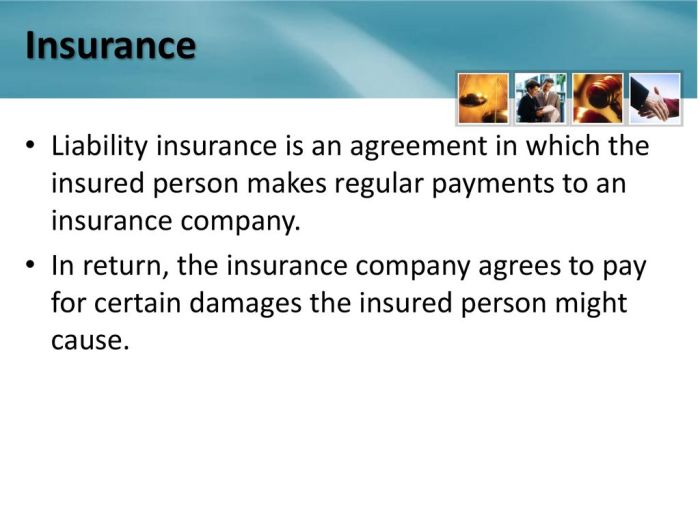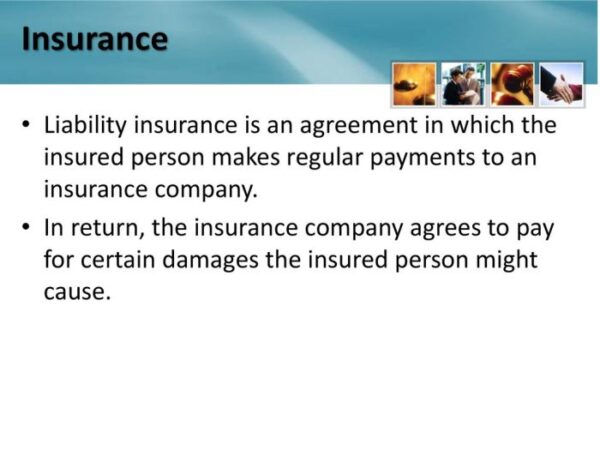
What does it mean when an insurance company accepts liability? It’s a question that often arises in the aftermath of an accident or incident, leaving individuals wondering about the implications and consequences. When an insurance company acknowledges its responsibility for a claim, it signifies a crucial step in the process of resolving the matter. This acceptance sets in motion a series of actions, including investigations, assessments, and negotiations, ultimately leading to a potential financial settlement or compensation for the affected party.
Understanding the intricacies of liability acceptance is essential for both the insured party and the insurance company. This article delves into the legal, financial, and practical aspects of this process, exploring the factors that influence an insurance company’s decision, the steps involved in handling a claim after liability is accepted, and the potential outcomes for all parties involved.
Understanding Liability Acceptance
When an insurance company accepts liability for an incident, it’s a big deal. It means they’re acknowledging that they’re responsible for the damages and are willing to pay up. But what exactly does it mean, and what factors influence this decision? Let’s break it down.
Legal Implications of Liability Acceptance
Accepting liability is a legal acknowledgment that the insurance company is responsible for the damages caused by the insured party. This means they’re legally obligated to compensate the injured party for their losses. The injured party can then file a claim with the insurance company, and the insurance company is legally required to process the claim and pay the agreed-upon amount.
Factors Influencing Liability Acceptance
Insurance companies don’t just hand out money willy-nilly. They carefully consider several factors before accepting liability. These include:
- The terms of the insurance policy: Each insurance policy has specific coverage details and exclusions. If the incident falls within the policy’s coverage, the insurance company is more likely to accept liability.
- Evidence of negligence: The insurance company will review evidence to determine if the insured party was at fault. This could include witness statements, police reports, and medical records.
- The potential cost of the claim: Insurance companies want to minimize their financial losses. If the cost of the claim is high, they might be more hesitant to accept liability.
- The potential for future claims: If the insurance company accepts liability for one incident, it could set a precedent for future claims. This is why they carefully consider the long-term implications of their decision.
Examples of Liability Acceptance and Denial
Here are some examples of situations where an insurance company might accept or deny liability:
- Car Accident: If an insured driver is involved in a car accident and is found to be at fault, the insurance company will likely accept liability. However, if the driver was intoxicated or speeding, the insurance company might deny liability, arguing that the driver violated the policy terms.
- Home Fire: If a home fire is caused by a faulty electrical wiring, the homeowner’s insurance will likely accept liability. However, if the fire was caused by the homeowner’s negligence, such as leaving a candle unattended, the insurance company might deny liability.
- Medical Malpractice: If a doctor makes a mistake during surgery that results in injury, the doctor’s malpractice insurance will likely accept liability. However, if the doctor can prove that the injury was caused by an unforeseen complication, the insurance company might deny liability.
Comparing Acceptance and Denial of Liability, What does it mean when an insurance company accepts liability
Accepting liability means the insurance company will cover the damages, while denying liability means they won’t. Here’s a comparison:
| Acceptance | Denial |
|---|---|
| Insurance company covers damages. | Insurance company does not cover damages. |
| Injured party can file a claim and receive compensation. | Injured party may have to sue the insured party to recover damages. |
| May lead to higher insurance premiums for the insured party in the future. | May lead to legal battles and financial hardship for the insured party. |
Consequences of Accepting Liability: What Does It Mean When An Insurance Company Accepts Liability

So, your insurance company has accepted liability for your claim. What’s next? It’s like when your favorite band finally releases a new album – you’re excited, but you need to know what’s on the tracklist, right? Well, let’s dive into the details of what happens after an insurance company accepts liability for a claim.
Claim Investigation and Assessment
After accepting liability, the insurance company will move into the investigation and assessment phase. This is like a detective story, where they gather evidence and try to understand the full scope of the claim.
Think of it as a three-step process:
* Gathering Information: The insurance company will collect all the relevant information about the claim, including your statements, medical records, police reports, and any other documentation.
* Evaluating Damages: They’ll evaluate the extent of the damages, which might involve getting independent assessments from experts like doctors, engineers, or appraisers.
* Negotiating a Settlement: Once they have a clear picture of the damages, the insurance company will start negotiating a settlement with you. This is where they’ll propose a financial offer to compensate for your losses.
Potential Outcomes for the Insured
Once the insurance company has accepted liability, there are a few possible outcomes for you, the insured party. It’s like playing a game of chance, but with a bit more certainty:
* Full Settlement: This is the best-case scenario where the insurance company agrees to pay you the full amount of your claim. It’s like winning the jackpot!
* Partial Settlement: In some cases, the insurance company might offer a partial settlement, which means they’ll pay you a portion of your claim. It’s like winning a smaller prize, but still better than nothing.
* Litigation: If you and the insurance company can’t agree on a settlement, you might have to take legal action. It’s like a game of legal chess, where you’ll need a good lawyer to fight for your rights.
Financial Settlements and Compensation Options
Here’s a breakdown of some common financial settlements and compensation options that might be offered:
| Compensation Option | Description | Examples |
|---|---|---|
| Medical Expenses | Covers the cost of medical treatment related to the incident, including doctor’s visits, hospital stays, medications, and rehabilitation. | Hospital bills, ambulance fees, physical therapy costs, prescription medications. |
| Lost Wages | Compensates you for income lost due to your inability to work as a result of the incident. | Missed workdays, lost wages, salary reduction. |
| Pain and Suffering | Awarded for physical and emotional distress caused by the incident. | Physical pain, emotional distress, mental anguish, scarring. |
| Property Damage | Covers the cost of repairing or replacing damaged property, including your vehicle, home, or personal belongings. | Car repairs, home repairs, replacement of personal items. |
Impact on the Insured Party
When an insurance company accepts liability, it can have a significant impact on the insured party, bringing both advantages and disadvantages. Understanding the implications of this decision is crucial for the insured party to make informed choices and protect their interests.
Benefits of Accepting Liability
The insured party can benefit from the insurance company’s acceptance of liability in several ways. Firstly, it removes the uncertainty and stress associated with legal battles. The insured party can avoid the time, expense, and emotional toll of litigation. Secondly, it provides a quicker path to compensation. Once liability is accepted, the insurance company typically initiates the claims process, expediting the payment of benefits. Lastly, it offers a higher likelihood of a fair settlement. Insurance companies are more likely to offer a reasonable settlement when they have accepted liability, recognizing their responsibility for the situation.
Drawbacks of Accepting Liability
While accepting liability has its benefits, there are also potential drawbacks for the insured party. One concern is that the insurance company may not offer a fair settlement amount. They may undervalue the insured party’s damages or attempt to minimize their compensation. Another drawback is the potential for a lengthy negotiation process. Even after liability is accepted, the insurance company may try to delay or stall the settlement negotiations, prolonging the wait for compensation. Finally, accepting liability may limit the insured party’s options for pursuing further legal action. Once they accept a settlement, they generally waive their right to sue the insurance company or the responsible party for additional damages.
Considerations for Accepting or Disputes
The insured party must carefully consider several factors before deciding whether to accept or dispute a liability claim. One key consideration is the strength of their case. If the insured party has strong evidence supporting their claim, they may be more inclined to dispute the insurance company’s offer and seek a more favorable settlement. Another important factor is the cost of litigation. If the legal fees and other expenses associated with a lawsuit are high, it may be more advantageous to accept a settlement offer, even if it’s not ideal. The insured party’s financial situation also plays a role. If they are in dire need of financial assistance, they may be more likely to accept a settlement, even if it’s less than they believe they deserve.
Steps to Take After Liability Acceptance
After an insurance company accepts liability, the insured party should take several steps to protect their interests. Firstly, they should carefully review the insurance policy to understand their coverage and benefits. Secondly, they should gather all relevant documentation, including medical records, repair estimates, and any other evidence supporting their claim. Thirdly, they should communicate with the insurance company regularly to track the progress of the claims process and ensure they are receiving timely updates. Lastly, they should seek legal advice if they have any concerns about the settlement offer or the claims process.
Legal Considerations

When an insurance company accepts liability, it’s not just a casual “oops, our bad.” There’s a whole legal framework behind it, a system of rules and precedents that shape how these situations unfold. It’s like a high-stakes game of legal chess, where every move has consequences.
Legal Framework
The legal framework surrounding insurance liability acceptance is a complex web of statutes, regulations, and case law. It’s a system that aims to balance the interests of the insured party, the insurer, and the public. Think of it as a legal roadmap, guiding everyone involved through the process.
Relevant Legal Precedents
Let’s talk about the big players in this legal game – the precedents. These are landmark court decisions that have set the standards for how insurance liability is handled. They’re like the “rulebook” for the legal world, providing guidance and clarity on key issues.
For example, the landmark case of *Brown v. Harris* established the “duty to defend” principle, which requires insurers to defend their policyholders even if the claim is ultimately found to be without merit. This precedent has significantly impacted the legal landscape of insurance liability, ensuring that policyholders receive legal representation in potentially complex situations.
Role of Legal Counsel
Navigating the legal complexities of liability acceptance can be a real head-scratcher, and that’s where legal counsel comes in. Think of them as your legal Sherpas, guiding you through the treacherous terrain of legal jargon and procedures. They’re the experts who understand the rules of the game, and they can help you make informed decisions and protect your rights.
Rights and Obligations
Let’s break down the rights and obligations of both the insurance company and the insured party in this scenario:
| Party | Rights | Obligations |
|---|---|---|
| Insurance Company |
|
|
| Insured Party |
|
|
Communication and Negotiation
Once an insurance company accepts liability, the communication and negotiation process begins. This is where the insurance company and the insured party work together to determine the terms of the settlement.
Communication Strategies
Insurance companies have specific communication strategies when accepting liability. The primary objective is to ensure a smooth and fair settlement process.
- Clear and Concise Communication: Insurance companies aim to communicate clearly and concisely with the insured party, explaining the acceptance of liability, the next steps in the process, and the available options for settlement.
- Transparency and Honesty: Transparency is crucial in building trust. Insurance companies strive to be upfront about the limitations of coverage, the factors influencing the settlement amount, and any potential delays.
- Active Listening: Effective communication involves listening to the insured party’s concerns and perspectives. Insurance companies may employ trained adjusters who can actively listen and understand the impact of the incident.
- Empathy and Compassion: While maintaining a professional approach, insurance companies may express empathy for the insured party’s situation, especially in cases of significant loss or injury.
Negotiation Strategies
Negotiation plays a vital role in determining the final settlement terms.
- Understanding the Insured Party’s Needs: Insurance companies will assess the insured party’s needs and potential losses, including medical expenses, property damage, lost wages, and emotional distress.
- Evaluating the Case: Insurance companies will carefully evaluate the case, considering factors like the extent of liability, the severity of the incident, and the evidence available.
- Negotiating a Fair Settlement: Both parties aim to reach a fair settlement that addresses the insured party’s losses while considering the insurance company’s financial obligations.
- Potential Negotiation Tactics:
- Compromise: Both parties may need to make concessions to reach an agreement.
- Counteroffers: Insurance companies may propose a settlement amount, and the insured party can counter with a different offer.
- Mediation: In complex cases, a neutral third party (mediator) can help facilitate negotiations and reach a mutually acceptable solution.
Last Word

In conclusion, when an insurance company accepts liability, it signals a significant shift in the dynamics of a claim. This acceptance triggers a chain of events, leading to investigations, assessments, and negotiations, ultimately culminating in a resolution that aims to fairly compensate the insured party. Understanding the implications of liability acceptance, the rights and obligations of all parties involved, and the legal framework surrounding this process is crucial for navigating this complex landscape. By approaching this process with clarity, communication, and informed decision-making, both the insured party and the insurance company can work towards a just and equitable outcome.
Questions and Answers
What happens if the insurance company denies liability?
If the insurance company denies liability, the insured party may need to pursue legal action to prove their claim. This could involve filing a lawsuit and presenting evidence to support their case.
How long does it take for an insurance company to accept liability?
The time it takes for an insurance company to accept liability can vary depending on the complexity of the claim, the amount of evidence required, and the insurer’s internal processes. It can range from a few days to several weeks or even months.
What are the common reasons for an insurance company to deny liability?
Common reasons for an insurance company to deny liability include: lack of coverage under the policy, policy exclusions, fraud, or a determination that the insured party was at fault for the incident.
Can I negotiate with the insurance company after they accept liability?
Yes, you can still negotiate with the insurance company after they accept liability. This may involve discussing the amount of compensation, the terms of payment, or other aspects of the settlement.
What if I disagree with the settlement offer from the insurance company?
If you disagree with the settlement offer, you can choose to reject it and pursue other options, such as negotiating further or filing a lawsuit.





